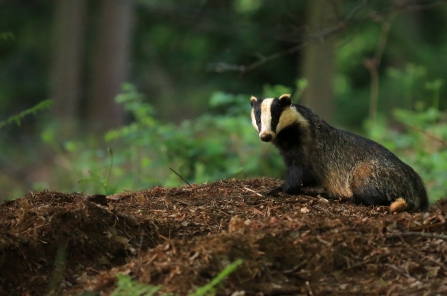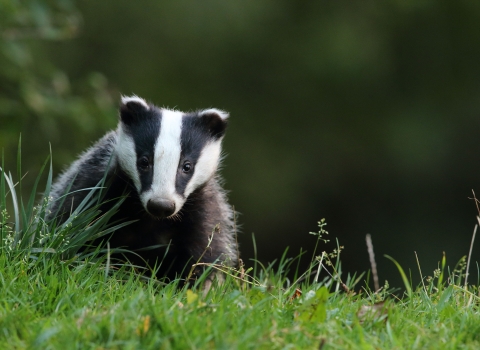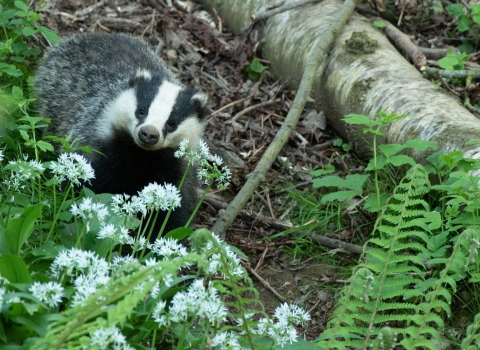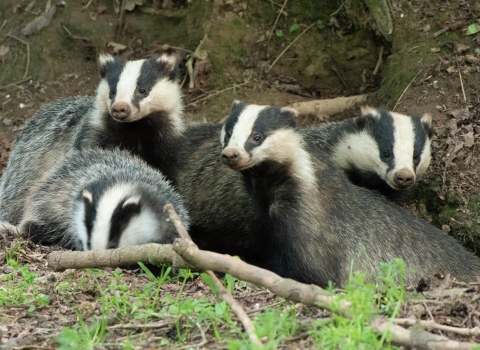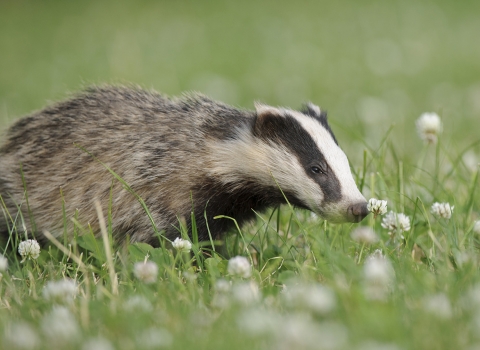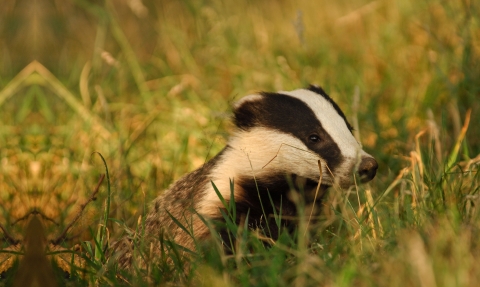
(c) Andrew Parkinson 2020Vision
Help us save Avon's badgers
Help us protect more of Avon’s badgers
We need to raise at least £20,000 to afford the essential vaccines, equipment and training we need to extend our badger vaccination work.
- £10 buys 5kg of peanuts to attract badgers to the vaccination area
- £40 buys a vaccine for one badger
- £200 buys vaccines for a family of badgers with their cubs
- £350 buys an annual safety accreditation for one trained vaccinator – a legal requirement for this work
- £750 buys professional training for a staff member to safely handle and vaccinate badgers
Thanks to people across Avon we've raised over £24,000! Please donate what you can to save our badgers.
Adopt a badger
You can also adopt a badger to show your support for our vaccination work and help save these wonderful animals. Click the link below to find out more about our Adopt a Species programme.
We need to act now to save our badgers and Avon Wildlife Trust’s badger vaccination programme is an important first step to winning both hearts and minds on this complex and distressing issue. It’s a cost-effective way to tackle bovine TB in badgers and I would urge everyone to support this appeal.
Film footage credit Richard Hopkins: edited by Joe Bell
Our badger vaccination programme
In the last few years, 68,000 badgers across England have been killed in an attempt to halt the spread of bovine TB – a disease which causes devastation to farmers and their livelihoods. Avon was for some time the only region in the South West where badgers were safe from culling but the Government has now announced new cull zones which include our region for the first time. We have begun work vaccinating badgers to protect them against bovine TB and help tackle this disease in a way which allows our wild badgers to thrive.
Over the next four years, we want to roll out our badger vaccination programme, working with farmers and landowners to ensure more badgers are protected from bovine TB. And we need your help to raise the funds to do this.
We don't allow badger culling on our land, or allow access over our land for culling, and will follow up with the relevant authorities in this situation. Badger persecution is a wildlife crime and should be reported to the police by calling 101 or visiting a station. Please help us protect these wonderful wild mammals.
Save Our Badgers is our response to the threat to badgers in Avon and beyond. Our programme of vaccination will start the process of protecting badgers locally and the results of this work will also help to demonstrate to the government that there is a more humane and cost effective alternative to culling nationally.
(c) Richard Hopkins
FAQs - find out more about bovine TB and badgers
What is bovine tuberculosis (bTB)?
Bovine tuberculosis is a highly infectious disease of cattle which devastates thousands of farming businesses annually. It is caused by the bacterium Mycobacterium bovis, which can also infect and cause TB in badgers, deer, goats, pigs and many other mammals. It is a chronic disease which can take years to develop. Since the mid-1980s, the incidence of bTB in cattle has increased substantially, creating an economic burden on the taxpayer and the farming industry, as infected cattle must be culled.
Cattle grazing is vital for many wildlife habitats. We work closely with local farmers and have grazing cattle on several of our nature reserves, where they play a valuable role in conservation.
Government research shows that bTB is not a major cause of death in badgers. Generally, infected badgers do not show any sign of infection, become severely affected by the disease or become infectious. Usually they die from other causes before this happens.
How is bovine TB spread?
The spread of bovine TB is primarily through the exchange of respiratory secretions between infected and uninfected animals. This transmission usually happens when animals are in close contact with each other.
Cattle to cattle transmission is the most serious cause of disease spread, which is substantiated by scientific evidence. Farmers are required by law to have their cattle regularly tested for bovine TB. A positive test for bovine TB will result in herd movement restrictions and the slaughter of affected cattle. Around 33,000 cattle were slaughtered for bovine TB control in England in 2017.
Badgers can also suffer from TB and can transmit the disease to cattle, though this is not the main transmission route. Badgers live in social groups with stable boundaries between groups. If a group is removed by culling, this disturbs the stability and there are likely to be changes in movement patterns of neighbouring groups. This increases the risk of infected animals moving into areas previously occupied by uninfected animals. This is referred to as ‘perturbation’.
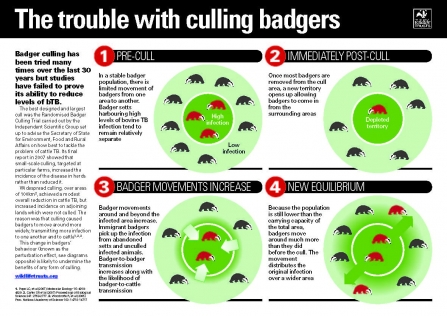
What’s the background to the culling policy?
Badgers are being culled as part of a government initiative to reduce the spread of bovine TB in cattle. Pilot badger culls began in 2013 in Gloucester and Somerset amid much opposition, with more than 300,000 people supporting a petition opposing the cull. An Independent Expert Panel was appointed by Defra to assess the effectiveness, humaneness and safety of the 2013 culls. The panel deemed the culls 'ineffective' and 'inhumane' in 2013, with no significant improvement - and further failures - in 2014.
Despite two parliamentary debates, a prominent opposition campaign and the support of numerous experts and high-profile figures, the number of areas increased in 2015. In 2016, 2017 and 2018 the Government announced further cull licenses, bringing the total number of badger cull areas to 32 across 10 counties. 32,934 badgers were culled in 2018 in England (figures include the Supplementary Culls in West Somerset 136 and West Gloucestershire 197).
The scientific evidence on the effectiveness of culling to prevent TB in cattle herds is inconclusive and conflicting. Some reports appear to show that culling has reduced TB but others that it has increased. A review of TB strategy chaired by Professor Sir Charles Godfray, reported in 2018 and states clearly that TB control efforts have focused too heavily on managing badgers, when most transmission occurs from cattle to cattle. The report makes some bold proposals about how to prevent such transmission. The Government has promised a response to the Godfray report in summer 2019.
What is the alternative to culling?
We believe an evidence-based and scientifically reliable approach must be developed to counteract the risk posed to cattle by bovine TB. The four priorities need to be:
- Accelerate progress on cattle vaccination
Cattle vaccination offers the best long-term way to reduce bovine TB. The research and trialling of a vaccine has been completed, but it needs accreditation which is blocked by an EU ban on its use. This is because the vaccine can interfere with the diagnostic skin test for TB in cattle. A DIVA test which can differentiate between naturally infected and vaccinated animals could help resolve this. PBD Biotech’s Actiphage® TB test has the capacity to differentiate between live, or viable, and non-viable cells - meaning that it can also distinguish between a vaccinated and an infected animal. This paves the way for new types of disease control when vaccines become available in the future, as called for as a priority by Professor Godfray in the Review of the Government’s 25-year Bovine (bTB) Strategy published in November 2018.[1] Actiphage is ‘additional test’ farmers want to use, says Godfray TB review. https://www.pbdbio.com/news/actiphage-is-test-farmers-want-to-use-godfr…
- Reduce cow-to-cow infections - the major cause of TB infection
The risk of spreading disease when cattle are transported can be minimised by tightening movement controls even further. More accurate testing can help pick up more animals at an early stage of infection, which are sometimes missed by current tests.
- Ensure higher standards of biosecurity on farms
Bovine TB transmission may occur via contaminated pasture or around farm buildings. Defra fund a free bovine TB service for farmers which can advise on biosecurity. Key biosecurity actions include:
- STOP infected cattle entering the herd
- REDUCE risk from neighbouring herds
- MINIMISE infection from cattle manure
- RESTRICT contact between badgers and cattle
- MANAGE cattle feed and water
The Godfrey review recommended increased ‘no regret’ biosecurity as an important element of bovine TB control. A study by the Food and Environment Research Agency concluded that exclusion measures can be 100% effective in preventing badgers entering farm buildings when deployed properly.
- Help to roll out badger vaccinations Vaccination of badgers and cattle has the potential to reduce bovine TB without the negative impacts of killing wildlife. Several Wildlife Trusts and other organisations are now carrying out vaccination programmes successfully, with training and expertise for this to be continued and extended to other areas. Government funding needs to be more widely available for this.
How effective is badger vaccination?
Badger vaccination involves adult badgers and cubs being humanely trapped and vaccinated by trained and licensed people. In a clinical trial, the vaccine reduced the risk of vaccinated badgers testing positive for progressed infection by 76% and reduced the risk of testing positive to any of the available live tests of infection by 54%. The trial also found that when more than a third of the badger social group was vaccinated it even protected unvaccinated cubs – their risk of infection reduced by 79%. Badger vaccination alone is not the solution to bTB, but it does have an immediate positive effect with no known associated negative impact on badgers or cattle.
What happens if you vaccinate badgers which already have TB?
There is no negative effect in vaccinating badgers which already have TB and in fact research shows that vaccinating already infected badgers slows the progression of the disease and reduces the likelihood of it being passed on to cubs. Badgers typically live for between three and five years. Over a four-year programme, vaccination should reduce new cases of TB in badgers (as in a field trial that was carried out in Gloucestershire) and infected animals will gradually die off. The combination of these processes should lead to a reduction in the number of infected badgers in an area.
What does vaccinating cost compared to culling badgers?
Badger vaccination is far cheaper than culling. Each dose of vaccine costs £40 and when Wildlife Trusts like Avon Wildlife Trust work with volunteers, costs can be as low as £82 per badger. This has been the experience of Derbyshire Wildlife Trust who have run a vaccination programme for several years.
It is difficult to get accurate figures on the total cost of culling so far across every region where it has taken place. A report in The Independent published in November 2018 estimated it at £40 million and published policing costs for Somerset alone between 2013 and 2017 amounted to more than £4,295,971 which works out as £1,229 per Somerset badger killed. Policing costs would not be necessary if the national strategy focused away from culling and towards badger vaccination together with other measures to control bovine TB.
Avon Wildlife Trusts needs to raise at least £20,000 to enable us to vaccinate badgers not just at this first pilot stage, but over the next four years working with farmers and landowners to extend the area and badger families that we can cover.
How many badgers or over what area in Avon do you need to vaccinate for it to have a significant effect?
Badgers are mobile species with territories that vary in size according to quality of habitat, availability of food and physical barriers to movements such as large rivers and motorways. On average in rural areas their home range will be around 50 hectares and there will be movements between family groups so, to be effective, vaccination needs to be done at a landscape scale.
We are aiming to match the area required under the government funded Badger Edge Vaccination Schemes (BEVS). The guidance states:
“The preferred size for applications under BEVS 2 will be 15km2 or larger. This area should consist of largely connected, accessible land. Entire farms should be included unless there is a compelling reason not to. Slightly smaller areas may be considered if they are designed to take advantage of barriers to badger movement or for other practical reasons.”
Initially we are vaccinating over a smaller area on our land as this is the land over which we have control. This will include a number of family groups.
How and where are you doing the vaccination work in Avon?
We are working with Somerset Badger Group whose trained volunteers are carrying out the vaccination alongside our staff who will assist and build up knowledge and experience.
The staff and volunteer team will install humane traps and help the badgers get used to them over a week-long period by putting peanuts inside, which the badgers will forage for. Then each night for two nights, the traps will catch any badgers that enter them for food and the team will vaccinate them and mark by clipping a small patch of fur and spraying them with stock spray paint to identify which badgers have been vaccinated. Each badger is then released unharmed.
Neither vaccinating or clipping the fur harms the animals and they are always handled gently and carefully.
To ensure the welfare of the badgers and limit disturbance to them as much as possible, we are not giving the location of the vaccination work. It’s in a woodland site with an established badger population.
How you can help
We are starting our badger vaccination programme with a small-scale pilot at one woodland site on an Avon Wildlife Trust nature reserve and want to extend this project over the next four years. To do this important work takes a great deal of our time and resources.
Please give to this appeal. The more money we raise, the more we can do to help protect Avon's badgers and show an alternative way to tackle bovine TB which affects wildlife and cattle.
Your donation will also help us to raise awareness and additional funds to further support all aspects of our work related to protecting badgers locally and making the case to government nationally that there is a humane and cost effective alternative to the badger cull.
Thank you
Please give as much as you can afford
I’m backing Avon Wildlife Trust’s work to vaccinate badgers in our region for the first time and protect these wonderful wild animals. I know that like me, people of all ages across Avon care deeply about our wildlife and want to help it flourish. This work is a really positive step to protecting badgers from bovine TB and I’m pleased to support it.
Wildlife and natural history TV presenter
Speak up for badgers today
The Wildlife Trusts have been working on the issue of bovine TB and its links to badgers for many years. We act based on robust scientific analysis and we believe that the distress of bovine TB will not be eradicated by a badger cull. It is not the answer for badgers or farmers and we call on the government to focus on a more durable and resilient strategy to reduce bovine TB.
You can raise your voice and speak up for badgers...
If you're interested in being involved in our future badger vaccination work please get in touch: mail@avonwildlifetrust.org.uk

